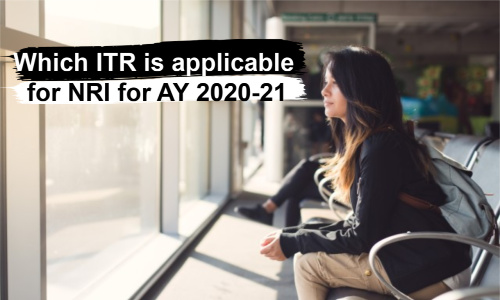ITR-1 cannot be used by the NRI for filing his return of income
Generally, every year, the income tax return forms are notified by the central government in the first week of the April month of the assessment year. For example: For the financial year 2018-19, the forms normally issued in April 2019. However, with the change in pattern, the Central board of direct taxes (CBDT) has notified the ITR-1 and ITR-4 for the financial year 2019-20 in the month of January 2019.

In which It contains the information which specified that which assessee can file the ITR-1 (Sahaj) and which assessee can file ITR-4 (Sugam) and other terms and condition which is required to be filled in the respective forms. Although the utility for these forms is not yet issued we know that it must be the same.
As per the ITR-1 (Sahaj), an assessee who is an ordinarily resident individual whose total income during the financial year 2019-20 is up to Rs.50 Lakhs, is required to file ITR-1 form. Although, there are other conditions are also prescribed by which it defines the eligibility of the assessee to file these forms. For example: Now, in the financial year, if all the above conditions are satisfied but such assessee has paid the electricity bill of Rs.1 Lakhs or more in aggregate, then he is not eligible for the filing of ITR-1. If you want to know about the changes made in ITR-1 and ITR-4 for the Assessment year 2020-21, then you can refer to our previous posted articles. In this article, whether a Non-resident individual can use ITR-1 for filing his return of income.
Well as the name suggests, he is a Non-resident and ITR-1 can be filed only by the ordinarily resident individual subject to other conditions. Hence, Non-resident cannot file ITR-1.
So, the next question arises, if Non-resident could not file the ITR-1 then which return is applicable for Non-resident.
Usually, I suggest my non-resident clients file ITR-2. However, we have seen the changes in the ITR-1 and ITR-4 for the assessment year 2020-21, hence, right now, I will not recommend any ITR form for my Non-resident friends. Although, it is final, that they cannot file ITR-1.
Yesterday, one of my non-resident friends called me and ask me about which forms he has to file for this assessment year i.e. the assessment year 2020-21. I gave him the same answer as I have mentioned here. But when I asked him about his previous returns, surprisingly, he was filing his return of income in ITR-1. Friends, if you are using the wrong form for filing of the return, then it will be considered as a defective return under section 139(9) of the income tax act, 1961. Although, there are other conditions that are also defined under this section, under which return shall be taken as a defective return but this point is very common that a person files his return using the wrong form.

Also, in case of defective return, the assessing officer shall send you the notice under this section and inform him to rectify the defect within 15 days from the date of receipt of the notice. If the assessee has not filed the rectified return within such 15 days, then the original return shall be considered as an invalid return and it shall be treated as if you have not filed the return and then interest and penalty shall be levied accordingly.
So, before filing the return of income, it is very important to know which return is being applied to you.
I hope this article will help you and if you have any doubt in this regard then you can call us. We will be happy to assist you.
